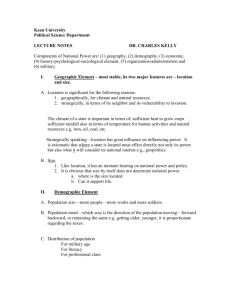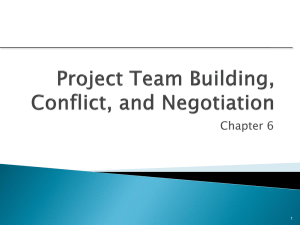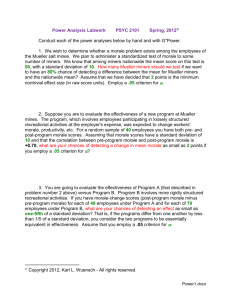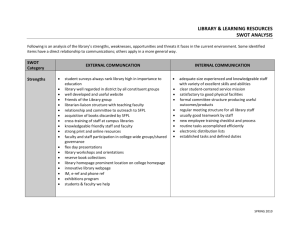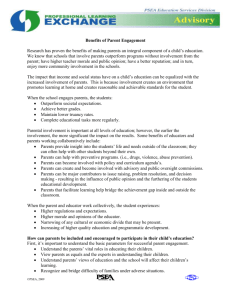Morale and Motivation
advertisement
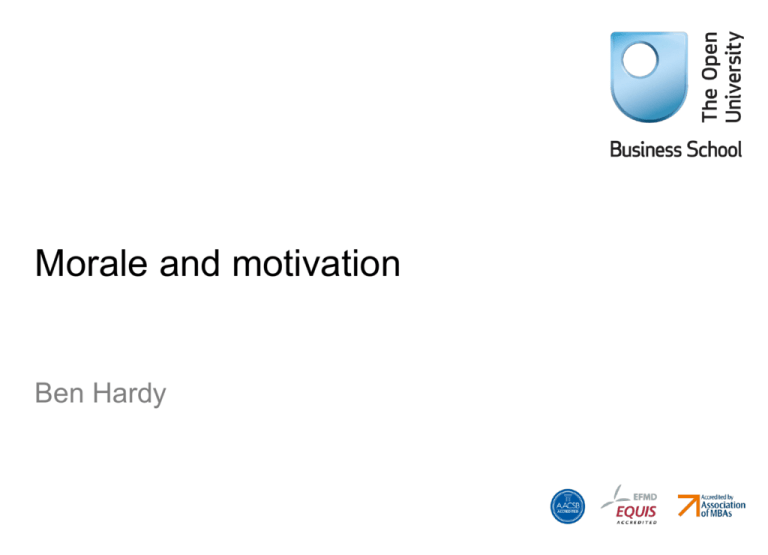
Morale and motivation Ben Hardy Structure of the talk • An outline of the fundamental problem • Motivation – A brief guide – Limitations of motivational techniques • Morale – Why it matters – The structure of morale – How to improve morale • A three step programme to improving morale The fundamental problem Labour is not the same as other commodities We hire the body and not the mind How do we get the best performance out of a workforce? How to optimise work • Scientific management – ‘One best way’ – Ergonomic – Henry Ford, F W Taylor • Human relations – Work is a complex social system – Elton Mayo and the Hawthorne studies MOTIVATION Motivation research • Incentive theories – People respond to incentives (or to avoiding disincentives) • Needs theories – Humans have an innate set of needs – They are motivated to satisfy these needs • Process theories – Expectancy theory • Goal setting theory – Specific, difficult goals produce high performance Goal setting theory Performance High Boring Challenging Impossible Low Goal difficulty After Locke, E. A. & Latham, G. P. 2002. Building a Practically Useful Theory of Goal Setting and Task Motivation: A 35-Year Odyssey. American Psychologist September, 57(9): 705-717 Problems with motivation theory • It works. But can produce unintended consequences – ‘Gaming’ the system – Not attending to negative consequences of achieving goals • Motivation theories neglect the role of emotions and social behaviour Setting specific, tough (but not impossible) goals can be highly motivating. But may damage your organisation in the process MORALE Why care about morale? ‘In my experience, the thing that has the most significant impact on a movie’s budget—but never shows up in a budget—is morale. If you have low morale, for every $1 you spend, you get about 25 cents of value. If you have high morale, for every $1 you spend, you get about $3 of value’ Brad Bird (Pixar), cited in Rao et al, 2008 ‘There is one key to profitability and stability during either a boom or bust economy: employee morale’ Herb Kelleher (SouthWest Airlines), cited in Sirota, 2005 Share price effects Test group Comparison group 19.94 16.3 20.03 15.58 6.1 3.38 High morale vs average Low morale vs average Average morale vs average Sirota, D., Mischkind, L. A., & Meltzer, M. I. 2005. The enthusiastic employee : how companies profit by giving workers what they want. Indianapolis, IN: Wharton School Pub McClelland, D. C., & Burnham, D. H. 2003. Power Is the Great Motivator. Harvard Business Review, 81(1): 117. Correlations with performance Non-battle casualties (rifles) -0.33 Stouffer, 1949 -0.41 Stouffer, 1949 -0.58 Johnsrud, 2002 Administrators intention to leave -0.37 Johnsrud, 2000 Productivity 0.27 Weakliem & Frenkel, 2006 Productivity 0.42 Australian Manufacturing Council Customer satisfaction 0.35 Australian Manufacturing Council Cashflow 0.25 Australian Manufacturing Council Defect rates 0.21 Australian Manufacturing Council Warranty costs 0.10 Australian Manufacturing Council Cost of quality 0.19 Australian Manufacturing Council % in full on time 0.21 Australian Manufacturing Council Non-battle casualties (heavy weapons) Faculty intention to leave Correlations with performance (χ2 = 355.719, df = 128 (p < 0.01). CMIN/df = 2.779, RMSEA = 0.067, NFI = 0.938, TLI = 0.951 and CFI = 0.959, SRMR = 0.0492) ‘If I’m particularly upbeat and morale is high as a result of that, I’m much more willing to talk to customers. You know and spend time with them. Whereas if you are a bit down morale wise, you want to get rid of them as quick as possible.’ (Shop Manager GCC) [With low morale] ‘You’re doing a job almost in a serial, everything’s in a queue, one after the other, rather than attempting things in parallel and doing several things at once.’ [as you would with high morale] (IT Manager, SRC). ‘you might be making parts out there and they might be off size or they might be taller… I’m not saying you wouldn’t really let bad work go, it would be…if it was out of tolerance you’d have to pull them out, if they were tight whereas in the past you’d pull them out, then you’d say ‘oh bollocks, let them go’, because they’d probably be ok anyway, they might not, then they’d come back’ (Machine Worker, BBM). Measuring morale The components of morale Emotional Future/ goal Interpersonal Emotional aspects of morale People want to feel that they are valued by the organisation and have value for the organisation • A sense of self worth – Thanks – Praise • Demonstration of contribution – Explaining the individual’s role and contribution Some examples • ‘He knows my name’ • ‘They trusted me to ride a very expensive showjumper’ • ‘I don’t have to thank my staff, their pay cheque at the end of the month is their thanks’ • ‘He worked very hard on that and then was just told it wasn’t good enough’ Future/goal aspects of morale People want to know where they’re headed and what progress they are making getting there • A clear direction – Clearly articulated, plausible • A sense of progress towards the objective – Sometimes you need someone to tell you where you are in the race Some examples • ‘I really would love to be associated with a vaccine for strangles’ [a terrible horse disease] • ‘morale was high, because we had brand new buildings, and there was just a sense of moving forward and moving up’ • ‘where do we go from here, because first you’ve got people who don’t seem to want to go in the same direction at the same speed’ • ‘you don’t know where you are, whether you’re on the track, or if you’re going in the right direction’ Interpersonal aspects of morale Reduce incivility and remember that people work with and for each other • Poor interpersonal relations dramatically lower morale – Reduce incivility • Soldiers fight for their friends – The bonds between colleagues may be stronger than those to the company • Other people are the conduits for important messages – Emotional and future/goal aspects of morale How to damage morale • It’s pretty easy • Emotional – Be unpleasant to people – Make them feel worthless • Future/goal – Remove hope for the future – Allow them to work in an information vacuum • Interpersonal – Allow incivility to blossom – Create division How to build morale • Work on each aspect of morale in turn – We’re only going to look at emotional and future/goal • Accept that morale takes far longer to build than it does to destroy Negative information has three times the impact of positive • Consistent positive pressure is needed • Morale was not built in a day Building morale - Emotional • Praise – Say ‘thank you’ – Celebrate achievement – Make praise specific • Criticism – Remember that any criticism will have three times the impact of a compliment – Make it constructive (i.e. about a situation, not about the person) • Show the individual’s contribution – Tell them how their work has made a difference The acid test • ‘Could I be replaced by someone else and no-one would care?’ • If the answer is ‘yes’ then you are not appropriately addressing the emotional dimension Building morale – Future/goal • Know where you are heading – What is the organisation trying to do? • Wal-mart –To give ordinary folk the chance to buy the same thing as rich people • Heinz –To be the world's premier food company, offering nutritious, superior-tasting foods to people everywhere. Google's mission is to organize the world's information and make it universally accessible and useful Space: the final frontier. These are the voyages of the starship Enterprise. Its five-year mission: to explore strange new worlds, to seek out new life and new civilizations, to boldly go where no man has gone before. Building morale – Future/goal • Are you progressing? – If so, then let people know • Newsletters • Town hall meetings – If you are not, then be honest and look for suggestions The acid test • ‘What does your organisation do?’ • If you can’t answer it in a single sentence then the goal dimension is not clear • ‘How are you getting on?’ • If you can’t answer this then the progress element is not clear. Summary • Motivation – Motivation techniques can improve performance – This may have unintended consequences – Think very carefully about what your goals may mean • Morale – Three elements • Emotion • Future/goal • Interpersonal Next steps • Improve morale within your team Emotional •Praise •Demonstrate contribution Future/goal •Have a clear vision •Articulate progress towards that vision Interpersonal •Reduce incivility •Remember that people often work for their friends, not the organisation Ben Hardy The Open University Walton Hall Milton Keynes MK7 6AA ben.hardy@open.ac.uk www.open.ac.uk

